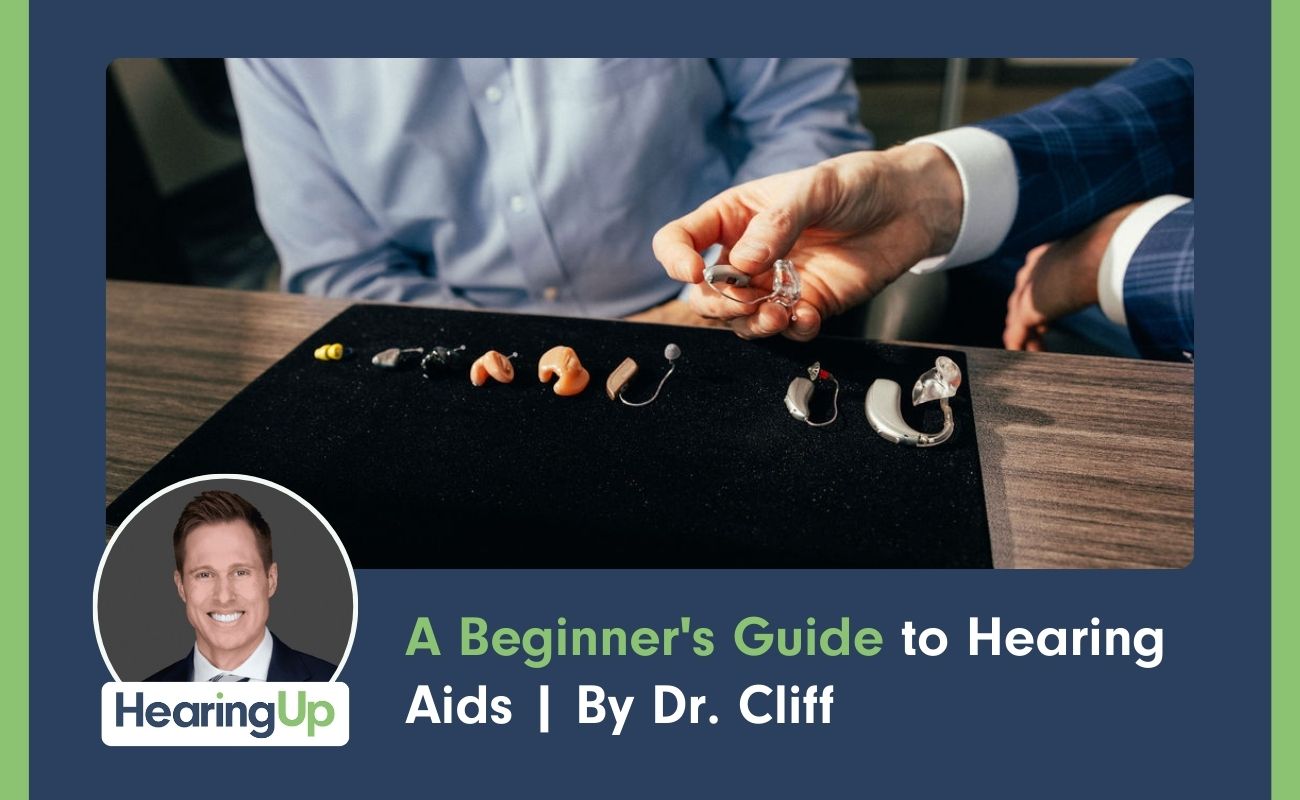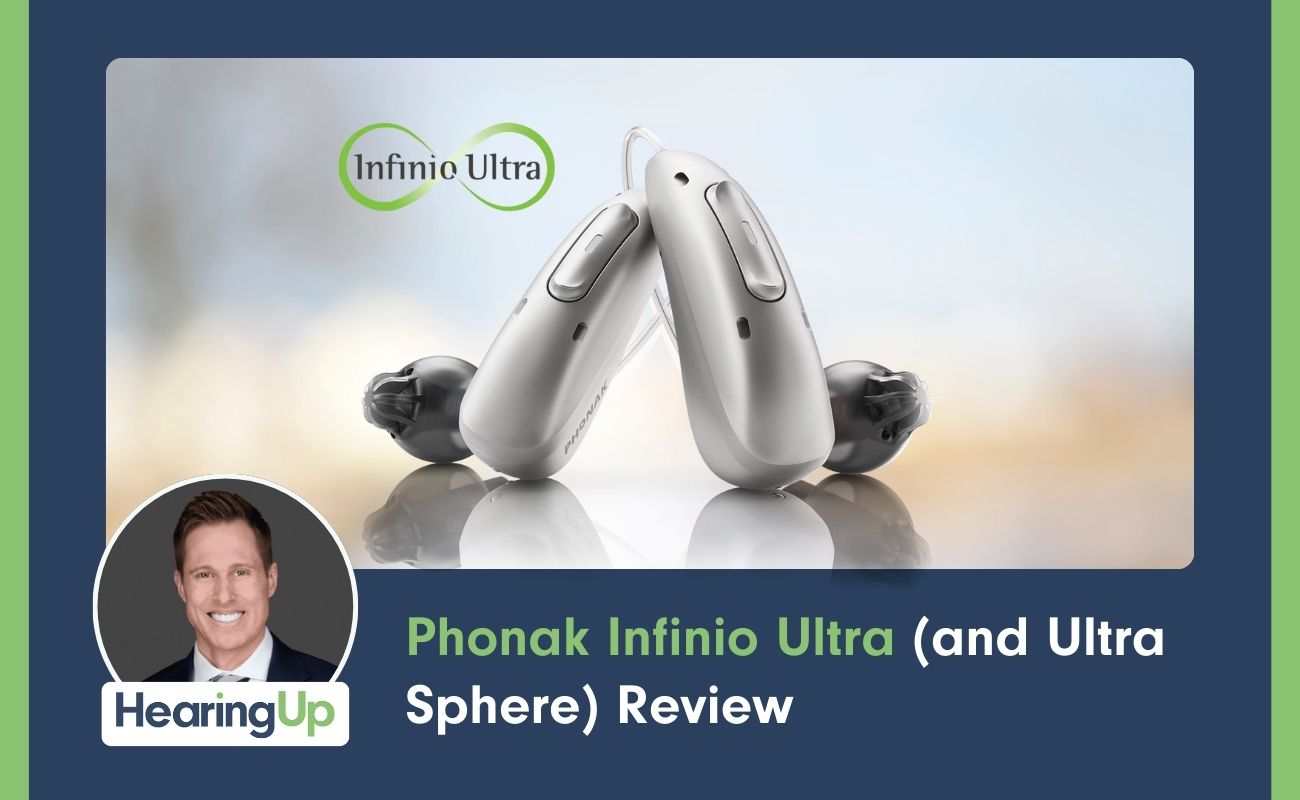Choosing the right hearing aid can be overwhelming, but it doesn't have to be. Dr. Cliff's Best Hearing Aid Buyer's Guide is designed to provide up-to-date, unbiased information to help you make an informed decision about your hearing health.
When seeking hearing aids, you have two main options:
1. Accept recommendations from your local audiology clinic
2. Conduct your own research
Dr. Cliff strongly advises doing your own research, noting that less than 30% of hearing care professionals follow best practices when testing, fitting, and programming hearing aids. By researching, you'll gain a better understanding of:
- Your hearing loss
- Available hearing aid options
- Proper treatment procedures
1. Ear Anatomy and Physiology
Understanding how your ears work helps you grasp the causes of hearing loss.
2. Types of Hearing Loss
The guide explains the three main types of hearing loss that your hearing care professional will identify during an evaluation.
3. Hearing Test Interpretation
Learn how to read your hearing evaluation and understand its impact on your treatment prognosis.
4. Hearing Aid Basics
Explore the fundamental components of hearing aids, including microphones, speakers, processors, amplifiers, and batteries.
5. Hearing Aid Styles
From invisible in-canal to ultra-power behind-the-ear devices, understand the various styles available.
6. Technology Levels and Features
Delve into the complexities of different technology levels and digital hearing aid features, with accompanying videos for clearer understanding.
7. Top Hearing Aid Brands
The guide highlights the best prescription hearing aids available, complete with product lineups and accessories.
8. Video Reviews
Each featured hearing aid has a comprehensive video review discussing pros and cons.
9. Best Practices in Hearing Care
Learn what procedures your hearing care professional should be performing to optimize your hearing ability.
10. Person-Centered Care
Understand why this approach is critical to your success with hearing treatment.
11. Bonus Checklist
A special checklist covers every aspect of your hearing treatment, ensuring your provider follows the right procedures.
- Regularly Updated: The guide is a "living document," revised frequently to reflect the latest advancements in hearing aid technology.
- Unbiased Information: It's not designed to sell you any specific product.
- Comprehensive: Covers all aspects of hearing loss and treatment.
- Focus on Professional Care: Emphasizes the importance of working with a qualified hearing care professional.
You can download Dr. Cliff's Best Hearing Aid Buyer's Guide by clicking here.
Remember to check back quarterly for updates, as hearing aid technology is constantly evolving.
Choosing the right hearing aids is a crucial decision that impacts your quality of life. By educating yourself about hearing aids and the importance of working with a qualified professional like the experienced Audiologists in the HearingUp network, you can ensure you get the most out of your new devices. Dr. Cliff's Best Hearing Aid Buyer's Guide is an invaluable resource in this process, providing you with the knowledge you need to make informed decisions about your hearing health.
Are you as sick as I am of all the outdated hearing aid buyer's guides out there? Deciding which hearing aids to buy can be as easy or as complicated as you want it to be. Generally speaking, you have two different options. You can either go to your local audiology clinic and take whatever recommendation they give you for hearing aids, or you can do some research yourself to determine which hearing aids are best for you. Personally, I think that just going to your local clinic without doing at least some research yourself can be a little bit risky. Considering that less than 30% of hearing care professionals follow best practices when testing your hearing or selecting fitting and programming your hearing aids, I would be a little bit wary of just taking the recommendation. This is why I recommend that you do some research to get a better understanding about hearing loss, which hearing aid options you have out there, as well as how you should be treated with those hearing aids.
Of course, in my extremely biased opinion, you could spend a ton of time watching 800 plus videos that I currently have on my YouTube channel, so you could get a very good understanding of your hearing loss and your treatment options. The second best thing that you could do is find a hearing aid buyer's guide that condenses all of this information to save you a bunch of time so you can get your hearing loss treated as soon as possible. However, not all hearing aid buyer's guides are created equal. Some of them are designed to only sell you one product. Others are so outdated that the information you get from them is completely irrelevant by the time you read it, and one of the most popular hearing aid buyer's guides out there is so flawed that it ranks two identical hearing aids differently just because they had different brand names.
In light of this problem, I spent a ton of time developing the Dr. Cliff's Best Hearing Aid Buyer's Guide because I wanted to create a buyer's guide that is not intended to sell you anything, is constantly revised, so it's up to date, gives you objective information about different hearing aids, and is focused on what you need to know about professional care to ensure you have massive success with your hearing treatment. The buyer's guide starts by explaining the anatomy of the human ear and how it works. Having a good understanding of your ear anatomy and physiology will help you better understand what is causing your hearing loss. Next, you'll learn the three different types of hearing loss, one of which your hearing care professional will identify during a comprehensive hearing evaluation. Following this, it goes on to discuss all aspects of a hearing test so you can better understand how to read your own evaluation and what impact this will have on the prognosis of your success with hearing aids.
Once you have a good understanding of your ear anatomy and physiology, the three different types of hearing loss, and how to read your audiogram, it's time to start working our way into how a hearing aid works, the different styles of hearing aids and the different technology levels of hearing aids. In general, the basic functionality of a hearing aid with the microphone, speaker, processor, amplifier, and battery, and the different styles of hearing aids from invisible in the canal to ultra power behind the ear devices should be relatively straightforward for you. However, things get a little bit more complicated when it comes to different technology
levels and digital hearing aid features. To help with this, I've included several videos in the Buyer's Guide that can quickly and easily explain some of the more difficult to understand topics to ensure you truly understand the capabilities of hearing aids. Hey guys, I hope you're enjoying this video so far. If you are, make sure that you hit that light button. It really helps out my channel, and if you have not yet subscribed to the channel with notifications turned on, go ahead and do that as well, because that ensures that you never miss one of my newly released videos and I release multiple new videos every single week. That being said, really appreciate it and let's go ahead and get back to the video. Now, you're probably wondering, Dr. Cliff, which brands of hearing aids are the best? Well, I'm glad you asked because we've highlighted all of the best prescription hearing aids on the planet, the hearing aids in their product lineup and their accessories.
To top it all off, each of these hearing aids has a comprehensive video review in the guide that will help you understand both the pros and cons of each brand and their offerings. Once you've got a decent understanding of each brand and the things that they offer, it's time for you to learn how to decide which hearing aid is best for you and what the treatment process is like. Like I always say, the success that you can expect with any hearing aid heavily depends on the hearing care professional that you go see and whether or not they follow best practices. This is why I always recommend you find a HearingUp provider in your area because they are committed to following comprehensive best practices so you can ensure that you get the maximum amount of benefit from your new hearing aids. Of course, the guide also explains what best practices are so you can understand what procedures your hearing care professional should be performing to optimize your hearing ability, as well as what person-centered care is and why
it is also a critical component to your success with hearing treatment. At the very end of the Buyer's Guide, I have a special bonus checklist that covers every aspect of your hearing treatment, and you can take that checklist into your hearing care professional to make sure that they treat your hearing loss the right way. The Dr. Cliff's Best Hearing Aid Buyer's Guide is a living document, which means that I update it regularly with new information and new videos. This is extremely important, especially since hearing aid technology is constantly evolving due to frequent advances in hearing aid technology. So how do you get this ever-changing Dr. Cliff Hearing Aid Buyer's Guide? Well, very simply, you can go into the description of this video, click on the link so you can download it, or you can go over to my website HearingUp.com, go to the resources tab and download it there. Just make sure that you check back about once a quarter because like I said, I'm always changing the information inside of the guide. Deciding which hearing aids you should buy can be a very difficult decision. That's why I recommend that you educate yourself not only in the hearing aids, but the hearing care professional that you go see to make sure that you get the most out of your new devices.
Are you as sick as I am of all the outdated hearing aid buyer's guides out there? Deciding which hearing aids to buy can be as easy or as complicated as you want it to be. Generally speaking, you have two different options. You can either go to your local audiology clinic and take whatever recommendation they give you for hearing aids, or you can do some research yourself to determine which hearing aids are best for you. Personally, I think that just going to your local clinic without doing at least some research yourself can be a little bit risky. Considering that less than 30% of hearing care professionals follow best practices when testing your hearing or selecting fitting and programming your hearing aids, I would be a little bit wary of just taking the recommendation. This is why I recommend that you do some research to get a better understanding about hearing loss, which hearing aid options you have out there, as well as how you should be treated with those hearing aids.
Of course, in my extremely biased opinion, you could spend a ton of time watching 800 plus videos that I currently have on my YouTube channel, so you could get a very good understanding of your hearing loss and your treatment options. The second best thing that you could do is find a hearing aid buyer's guide that condenses all of this information to save you a bunch of time so you can get your hearing loss treated as soon as possible. However, not all hearing aid buyer's guides are created equal. Some of them are designed to only sell you one product. Others are so outdated that the information you get from them is completely irrelevant by the time you read it, and one of the most popular hearing aid buyer's guides out there is so flawed that it ranks two identical hearing aids differently just because they had different brand names.
In light of this problem, I spent a ton of time developing the Dr. Cliff's Best Hearing Aid Buyer's Guide because I wanted to create a buyer's guide that is not intended to sell you anything, is constantly revised, so it's up to date, gives you objective information about different hearing aids, and is focused on what you need to know about professional care to ensure you have massive success with your hearing treatment. The buyer's guide starts by explaining the anatomy of the human ear and how it works. Having a good understanding of your ear anatomy and physiology will help you better understand what is causing your hearing loss. Next, you'll learn the three different types of hearing loss, one of which your hearing care professional will identify during a comprehensive hearing evaluation. Following this, it goes on to discuss all aspects of a hearing test so you can better understand how to read your own evaluation and what impact this will have on the prognosis of your success with hearing aids.
Once you have a good understanding of your ear anatomy and physiology, the three different types of hearing loss, and how to read your audiogram, it's time to start working our way into how a hearing aid works, the different styles of hearing aids and the different technology levels of hearing aids. In general, the basic functionality of a hearing aid with the microphone, speaker, processor, amplifier, and battery, and the different styles of hearing aids from invisible in the canal to ultra power behind the ear devices should be relatively straightforward for you. However, things get a little bit more complicated when it comes to different technology
levels and digital hearing aid features. To help with this, I've included several videos in the Buyer's Guide that can quickly and easily explain some of the more difficult to understand topics to ensure you truly understand the capabilities of hearing aids. Hey guys, I hope you're enjoying this video so far. If you are, make sure that you hit that light button. It really helps out my channel, and if you have not yet subscribed to the channel with notifications turned on, go ahead and do that as well, because that ensures that you never miss one of my newly released videos and I release multiple new videos every single week. That being said, really appreciate it and let's go ahead and get back to the video. Now, you're probably wondering, Dr. Cliff, which brands of hearing aids are the best? Well, I'm glad you asked because we've highlighted all of the best prescription hearing aids on the planet, the hearing aids in their product lineup and their accessories.
To top it all off, each of these hearing aids has a comprehensive video review in the guide that will help you understand both the pros and cons of each brand and their offerings. Once you've got a decent understanding of each brand and the things that they offer, it's time for you to learn how to decide which hearing aid is best for you and what the treatment process is like. Like I always say, the success that you can expect with any hearing aid heavily depends on the hearing care professional that you go see and whether or not they follow best practices. This is why I always recommend you find a HearingUp provider in your area because they are committed to following comprehensive best practices so you can ensure that you get the maximum amount of benefit from your new hearing aids. Of course, the guide also explains what best practices are so you can understand what procedures your hearing care professional should be performing to optimize your hearing ability, as well as what person-centered care is and why
it is also a critical component to your success with hearing treatment. At the very end of the Buyer's Guide, I have a special bonus checklist that covers every aspect of your hearing treatment, and you can take that checklist into your hearing care professional to make sure that they treat your hearing loss the right way. The Dr. Cliff's Best Hearing Aid Buyer's Guide is a living document, which means that I update it regularly with new information and new videos. This is extremely important, especially since hearing aid technology is constantly evolving due to frequent advances in hearing aid technology. So how do you get this ever-changing Dr. Cliff Hearing Aid Buyer's Guide? Well, very simply, you can go into the description of this video, click on the link so you can download it, or you can go over to my website HearingUp.com, go to the resources tab and download it there. Just make sure that you check back about once a quarter because like I said, I'm always changing the information inside of the guide. Deciding which hearing aids you should buy can be a very difficult decision. That's why I recommend that you educate yourself not only in the hearing aids, but the hearing care professional that you go see to make sure that you get the most out of your new devices.

Hearing aid success requires 90-min evaluations, Real Ear Measurement programming, appropriate tech selection, 30-day adaptation and ongoing professional follow-up.
Read More
Phonak Infinio Ultra firmware adds AutoSense OS 7.0 (24% better), 30% improved battery (10hrs with AI), simplified Bluetooth pairing, and faster feedback tests.
Read More
Starkey Omega AI improves on Edge AI with DNN 360 (19.6% better speech clarity), spatial awareness, find-my-hearing-aid lights, and 20x stronger custom shells.
Read More
HRV objectively measures stress affecting tinnitus by tracking autonomic balance, enabling data-driven treatment adjustments via Modern Tinnitus Basecamp.
Read More
Top 2026 RIC hearing aids: Phonak Ultra Sphere Infinio (AI noise reduction), Starkey Omega AI, Oticon Intent, Signia IX, Widex SmartRIC.
Read More
Best 2026 invisible aids: Oticon Zeal (AI/Auracast), Phonak Lyric (self-replace), Starkey IIC (minimal), Phonak Titanium (durable), Oticon Own (AI processing).
Read More